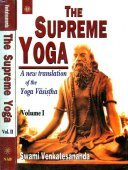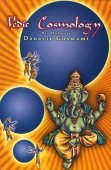Foolish: 1 definition
Introduction:
Foolish means something in Hinduism, Sanskrit. If you want to know the exact meaning, history, etymology or English translation of this term then check out the descriptions on this page. Add your comment or reference to a book if you want to contribute to this summary article.
Images (photo gallery)
In Hinduism
Yoga (school of philosophy)
Source: ORA: Amanaska (king of all yogas): A Critical Edition and Annotated Translation by Jason BirchFoolish (persons) are denoted by the Sanskrit term Durmati, according to the Amanaska Yoga treatise dealing with meditation, absorption, yogic powers and liberation.—Accordingly, as Īśvara says to Vāmadeva: “[...] Not knowing the highest reality, which is situated within himself, the confused man goes astray [looking for it] in the scriptures, [just as] the foolish (durmati) herdsman looks in a well while the [missing] goat is [being held] under his armpit. [...]”.

Yoga is originally considered a branch of Hindu philosophy (astika), but both ancient and modern Yoga combine the physical, mental and spiritual. Yoga teaches various physical techniques also known as āsanas (postures), used for various purposes (eg., meditation, contemplation, relaxation).
See also (Relevant definitions)
Starts with: Foolish Babble.
Full-text (+740): Murkha, Mudha, Yathajata, Sammudha, Durbuddhi, Vaidheya, Durmati, Pramudha, Alpadhi, Muh, Balisa, Gairamasalata, Sudurbuddhi, Bevakuba, Vivekavishranta, Nirviveka, Vimudhatman, Apramura, Vrithamati, Aneda.
Relevant text
Search found 237 books and stories containing Foolish; (plurals include: Foolishes). You can also click to the full overview containing English textual excerpts. Below are direct links for the most relevant articles:
Brihad Bhagavatamrita (commentary) (by Śrī Śrīmad Bhaktivedānta Nārāyana Gosvāmī Mahārāja)
Verse 1.7.86 < [Chapter 7 - Pūrṇa (pinnacle of excellent devotees)]
Verse 1.5.123 < [Chapter 5 - Priya (the beloved devotees)]
Verse 1.7.77-78 < [Chapter 7 - Pūrṇa (pinnacle of excellent devotees)]
Dhammapada (Illustrated) (by Ven. Weagoda Sarada Maha Thero)
Verse 63 - The Story of Two Pick-pockets < [Chapter 5 - Bāla Vagga (Fools)]
Verse 26-27 - The Story of Bāla Nakkhatta Festival < [Chapter 2 - Appamāda Vagga (Heedfulness)]
Verse 355 - The Story of a Childless Rich Man < [Chapter 24 - Taṇhā Vagga (Craving)]
Garga Samhita (English) (by Danavir Goswami)
Verse 5.8.20 < [Chapter 8 - The Killing of Kaṃsa]
Verse 4.17.4 < [Chapter 17 - Prayers to Srī Yamunā]
Verses 2.18.20-21 < [Chapter 18 - The Sight of Śrī Kṛṣṇacandra]
The Tattvasangraha [with commentary] (by Ganganatha Jha)
Verse 88-89 < [Chapter 2 - Examination of the Doctrine of God (theism)]
Verse 3019-3020 < [Chapter 25 - Examination of the Doctrine of ‘Self-sufficient Validity’]
Verse 2595-2599 < [Chapter 24b - Arguments against the reliability of the Veda (the Revealed Word)]
Maha Prajnaparamita Sastra (by Gelongma Karma Migme Chödrön)
Appendix 4 - The impermanence of the mind (cittānityatā) < [Chapter XXXI - The Thirty-seven Auxiliaries to Enlightenment]
Story of the trick of the self-interested disciples < [Chapter XXIII - The Virtue of Morality]
Story of the impostor bramacārin exposed by the Bodhisattva < [Chapter XXVII - The Virtue of Exertion]
Chaitanya Bhagavata (by Bhumipati Dāsa)
Verse 3.5.229 < [Chapter 5 - The Pastimes of Nityānanda]
Verse 3.2.498 < [Chapter 2 - Description of the Lord’s Travel Through Bhuvaneśvara and Other Placesto Jagannātha Purī]
Verse 2.24.18 < [Chapter 24 - The Lord Displays His Universal Form to Advaita]
Related products


